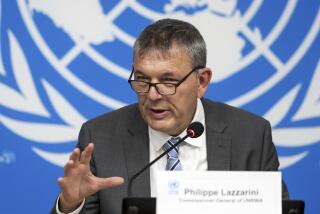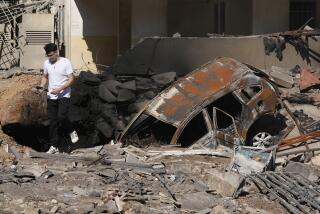Bomb Kills Palestinian Militia Chief
- Share via
TULKARM, West Bank — Raed Karmi knew he was a marked man. To avoid exposure, he frequently took a shortcut by the local cemetery, up a short hill and through an olive grove.
As Karmi walked the path Monday morning from his safe house, a bomb planted alongside the cemetery wall exploded. Karmi, a top Palestinian militia commander who proudly confessed to murdering Israelis, was killed instantly.
Israeli officials would neither confirm nor deny that they ordered his death, but they quickly welcomed it. If Karmi--who stood near the top of Israel’s most-wanted list--was killed by the Israelis, it would be the first time the government of Prime Minister Ariel Sharon has successfully used its internationally condemned assassination policy in nearly two months.
In keeping with recent history, revenge and counterattack appear likely to follow: Hours after Karmi was killed, an Israeli soldier was shot dead while driving near a Jewish settlement on the road to Tulkarm.
Karmi’s militia, an offshoot of Palestinian Authority President Yasser Arafat’s Fatah movement, claimed responsibility for shooting the soldier and wounding his companion. The Al Aqsa Martyrs Brigade also announced that it would no longer heed a truce with Israel observed since mid-December.
With the killing of Karmi, Israel has “opened the gates to hell,” the Tulkarm branch of the group warned in a leaflet. “The hoax of the so-called cease-fire is canceled, canceled, canceled.”
Young Palestinian men read the scathing statement over loudspeakers Monday afternoon from the back of a pickup truck that was coursing Tulkarm’s streets, made nearly empty by a general protest over Karmi’s killing.
The news of his death came as Israel sent bulldozers into a Palestinian neighborhood in East Jerusalem to demolish nine homes. Israeli officials said the homes were built without permits; the U.S. government condemned the action as provocative. It came amid continuing domestic and international outcry over Israel’s demolition last week of dozens of Palestinian homes in the Gaza Strip, a move Sharon’s government said was part of its fight against arms smuggling.
In Tulkarm, an angry, mournful crowd carried Karmi’s body to the city hospital amid cries for revenge.
Tulkarm in many ways encapsulates the eye-for-an-eye nature of more than 15 months of Middle East bloodletting. Karmi was sought by the Israelis for his role in several killings, starting with the Jan. 23 shooting of two Tel Aviv restaurateurs in Tulkarm. The pair had gone to the town with an Arab friend to shop and eat lunch, something Israelis used to do frequently before the current conflict erupted.
Karmi and his fellow gunmen killed the restaurant owners to avenge the death three weeks earlier of Thabet Thabet, a dentist and head of the Fatah movement in Tulkarm. Israeli forces shot him as he left his home, in one of the most controversial of the dozens of assassinations that Israel has carried out in the name of self-defense. Several Israeli peace activists and politicians defended Thabet and argued that the military had killed the wrong man; the army said he had directed shooting attacks.
Thabet’s slaying gave momentum to Karmi’s militia, which he formed along with Thabet’s nephew, Maslamah Thabet.
The younger Thabet, milling outside the hospital Monday with numerous armed men, said Karmi left his hide-out after receiving a telephone call and was killed half a block down the road by what Thabet believed was a remote-controlled bomb. The blast left a small pit in the road and a puddle of blood, which Palestinian children were examining Monday afternoon.
“There is no question Israel is behind this,” Thabet said, nervously chain-smoking and fiddling with his cellular phone.
Karmi, 27, survived an earlier attempt on his life. On Sept. 6, Israeli helicopter gunships fired missiles into his car as he and three companions drove on the outskirts of Tulkarm. He and the driver escaped; the two others were killed.
His close call made him something of a celebrity here. He boasted that God was on his side and that Israel couldn’t touch him. He appeared at funerals and on television.
Lately, Palestinians say, Karmi and his men had been abiding by a suspension of hostilities ordered by Arafat on Dec. 16. A period of relative calm followed, but it was shattered last week by an Islamic militant attack on an Israeli army post near the Gaza Strip. Four Israelis and two Palestinians were killed.
Israeli officials hold Karmi responsible for the slayings of nine Israelis, including the two restaurateurs. They said Monday that the fact Karmi was on the loose exposes the hypocrisy of Arafat’s pledge to rein in violence by arresting militants wanted by Israel. Sharon spokesman Raanan Gissin said the Palestinian Authority recently had notified Israel that Karmi was in custody.
“A man like this is like a ticking bomb,” Israeli Transportation Minister Ephraim Sneh told reporters when asked if the timing of Monday’s blast--amid a relative lull in violence and during renewed U.S. efforts to broker peace--was ill-advised. “He who lives by the sword dies by the sword.”
Palestinian officials, in turn, accused Israel of attempting to provoke Palestinian violence to sabotage the mission of U.S. envoy Anthony C. Zinni. The retired Marine Corps general is expected to return to the region soon.
On the eve of Zinni’s first official trip to the region in November, Israel assassinated Mahmoud Abu Hanoud, a top military commander of the radical Islamic movement Hamas. The group exacted revenge with a burst of suicide bombings.
Karmi’s friends and family promised Monday that more revenge will follow.
“This is an excuse now for us to kill any Israeli,” Karmi’s 18-year-old half brother, Raef, said. “As we have here a new widow, a new orphan, a lost brother, there will be someone in Israel who will suffer the same.”
Relatives said the timing of Monday’s explosion caught them off guard.
“They killed him when things here had been quiet. I was surprised when I heard that there was another martyr; there’s a cease-fire, after all,” said Hadija Saai, a cousin.
“He was always taking precautions, but he was not afraid,” said Karmi’s widow, Linda, 24, at the family home. She was surrounded by female relatives who passed among them the Karmis’ 6-month-old daughter, Filistine.
Hours after the blast killed Karmi, Palestinian gunmen opened fire near the West Bank Jewish settlement of Shavei Shomron, killing the Israeli soldier. Sporadic shooting was reported throughout the area.
In Jerusalem, meanwhile, Foreign Minister Shimon Peres said he, Sharon and Defense Minister Binyamin Ben-Eliezer had decided to stop demolitions of Palestinian homes in the West Bank and Gaza Strip following a firestorm over last week’s destruction of houses in the Rafah refugee camp in Gaza.
“We learned a lesson and reached the conclusion that [with] this method, the damage it causes is greater than the benefit,” Peres said.
But Sharon and Ben-Eliezer later contradicted Peres, saying there had been no change in policy. Both indicated that home demolitions will continue based on “security considerations.”
*
Times staff writer Mary Curtius in Jerusalem contributed to this report.
More to Read
Sign up for Essential California
The most important California stories and recommendations in your inbox every morning.
You may occasionally receive promotional content from the Los Angeles Times.











